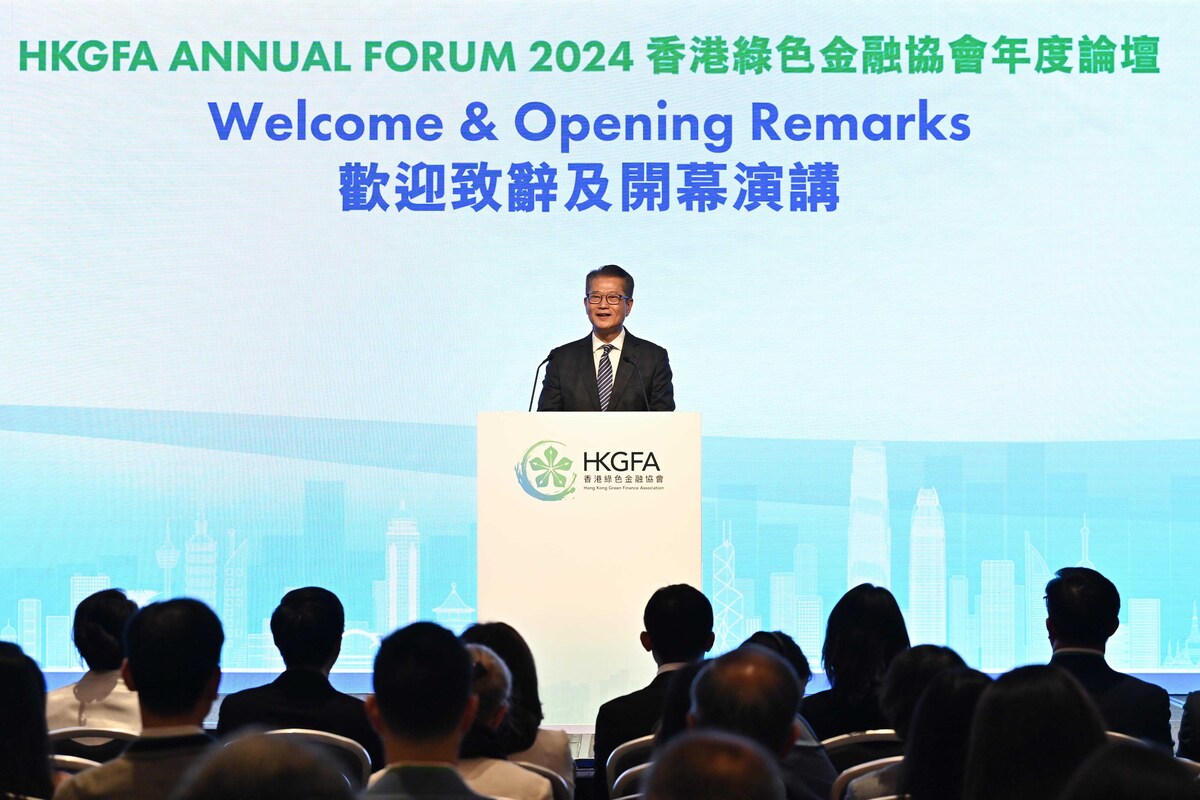
The global push to combat climate change offers a bounty of sustainable investment opportunities for Hong Kong as carbon-belching enterprises pivot toward eco-friendly strategies, green industry insiders said at the Hong Kong Green Finance Association (HKGFA) Annual Forum 2024 on Wednesday.
In his speech at the forum — themed “Financing Asia’s Net Zero Transition” — Hong Kong Financial Secretary Paul Chan Mo-po said the global push to realize carbon neutrality targets creates vast green investment opportunities.
He noted that the international community has recognized the need to assist high-emission and heavily polluting industries in achieving sustainable development by providing financial and technological resources.
“Transition finance offers a unique business opportunity for Hong Kong,” he added. Transition finance investments aim to decarbonize high-emitting and hard-to-abate industries such as steel production, aviation, and shipping.
However, he noted that one of the challenges in transition finance is “greenwashing”, a term referring to the practice of making misleading claims about the environmental benefits of a product, service, or company.
“It is crucial to ensure that funds finance legitimate carbon reduction practices rather than prolong unsustainable ones,” he said.
The finance chief said Hong Kong has made big strides in sustainable investing, with annual green bonds and debt issuance averaging over $63 billion over the past three years.

He also noted a steady growth in the number of ESG (environmental, social and governance) funds authorized by the Securities and Futures Commission. As of June, the city had more than 230 ESG funds, with assets under management surpassing $160 billion, marking a 60 percent surge from three years ago.
This growth “demonstrates Hong Kong’s solid foundation in green finance”, the finance chief said, citing the city’s robust regulatory framework and sophisticated market infrastructure.
ALSO READ: Mainland sustainability bonanza beckons for HK green finance
Ma Jun, chairman and president of HKGFA, organizer of the forum, said Hong Kong should consider adopting some elements of the Chinese mainland’s transition finance standards to boost local development in this sector.
Ma noted that 22 local governments on the mainland have already published classification methods for transition finance, and the People’s Bank of China, or the central bank, has also launched a national standard pilot program for transition finance.
“Adopting these standards could guide private capital to transition activities,” Ma said.
He suggested further adoption of the International Sustainability Standards Board disclosure standards in Hong Kong, which could provide guidance for financial institutions and corporations in information disclosure.
However, Ma acknowledged challenges in applying ISSB disclosure standards, including carbon emissions calculations and climate risk analysis.

Zhang Bei, deputy director-general of the research bureau of the People’s Bank of China, said the Chinese central bank has made big progress in developing transition finance standards since launching the initiative in 2022.
Zhang said the central bank has launched the second batch of standards, which cover seven industries including copper, aluminum, and textiles. The first batch of standards covers four key sectors, namely steel, building materials, agriculture and thermal power generation.
Albert Park, chief economist of Asian Development Bank, said the bank positions itself as a climate bank for the Asia-Pacific region, and has pledged to offer up to $100 billion in climate-related financing between 2019 and 2030.
The bank is working to reduce risks in sustainable projects through blended finance and grants, Park said. He cited last year’s funding of Cambodia’s energy transition plan as an example, noting that Hong Kong financial institutions also participated in the initiative.
The hybrid event, held both in person and virtually, drew over 1,500 participants, including policymakers, regulators, and representatives of financial institutions, businesses, and civil society, from the Hong Kong Special Administrative Region, the mainland, and other regions worldwide.
READ MORE: Chan: HK a leader in Asia in green sustainable finance
Founded in 2018, the Hong Kong Green Finance Association aims to elevate the city as a global green finance hub by expanding Hong Kong financial institutions’ access to green financing transaction deals in the city, on the mainland, and in economies involved in the Belt and Road Initiative.


